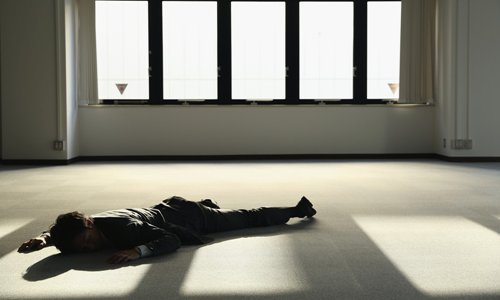
Photo: IC
"For years I lived in fear of my ex-wife's emotional and physical outbursts," Cao said. "From a young age men are taught that they must tolerate and protect women. The unspoken rule is that victims of domestic abuse are women or children, as a man, it was not a topic I felt comfortable talking about."
China's law against domestic violence, the first piece of legislation in the country specifically dealing with domestic abuse, took effect in March. Even though the law clearly stipulates that all victims should be treated equally, the sad reality is that male victims are even more likely to be overlooked than their female fellow victims.
According to Sichuan Province's Women's Federation, of the 1,845 cases of domestic violence reported in the southwestern province in 2015, 2 percent involved adult male victims.
Moreover, a report published by the National Center for Injury Prevention and Control said one in four adult men in the US will become a victim of domestic violence during his lifetime. That's upward of 3 million male domestic violence victims every year, or one man in America abused by an intimate or domestic partner every 37.8 seconds, The Huffington Post reported in 2015.
Stay quiet
"Weighed down by traditional views, men are more inclined to stay quiet, let alone seek legal support," said Ouyang Yanwen, an expert on anti-domestic violence at Hunan Police Academy.
While the new law has been lauded for defining what constitutes domestic violence, there are still gray areas.
"Legally, there is no such crime as emotional abuse," said Ouyang. "It is just too hard to define and even harder to collect evidence."
Article Three of the domestic violence law "forbids domestic violence of any form," which, according to Yang, covers emotional or non-verbal abuse.
While physical abuse often leaves marks, emotional abuse inflicts invisible scars, but the victim is damaged nonetheless.
Cao has been divorced for four years but he has since struggled to establish close relationships with women. Any attempt at dating has reopened the wounds of his past relationship.
Due to a lack of evidence, Cao lost the divorce lawsuit and had to settle with his ex-wife.
"Usually the court is inclined to protect women and children. A doctor's certificate doesn't even hold up in court," Yang said, adding that the new law needs to be continuously revised and improved.
Wu Ning, a psychologist at the No.187 Hospital of the People's Liberation Army, said male victims of abuse often struggle with anger, fear, anxiety and depression.
"If not properly dealt with, such emotions could deteriorate and hurt the spousal relationship, or most commonly, be unleashed on the children at home," Wu said.
The Anti-Domestic Violence Law has helped educate the public about the definition of "appropriate behavior" and gives victims legal backing should they want to file criminal charges against their abuser, Ouyang said.
Take it seriously
Courts in many Chinese provinces including Hunan, Hubei, Anhui and Guangdong have issued protection orders to male victims of abuse.
Ouyang said the law clearly outlines the responsibilities of various departments, and will help multi-institutional cooperation.
"In practice, it has been noted that intervention and prevention needs the support and coordination of all levels of society. The abused must know their rights, the abusers must understand the legal consequences, and law enforcers must take the offences seriously."
The government of Chengdu, capital of Sichuan, planned to open a new shelter for victims of domestic violence where both men and women will be accepted, media reported in February.
"Adult male victims can also seek help from us," an official with the Chengdu relief station was quoted by the Chengdu Business Daily as saying.
The shelter also said female victims can take their underage children to the shelter, which will make arrangements for assistance from social workers and other professionals and may even help find foster families if necessary.
Cai Yiping, a Beijing-based anti-domestic violence expert, told the Global Times previously that domestic violence shelters should also offer help for gay men and women who may be victims of violence by their partners.
Cai said the law should protect victims in any intimate relationship, including but not limited to marital relations.
